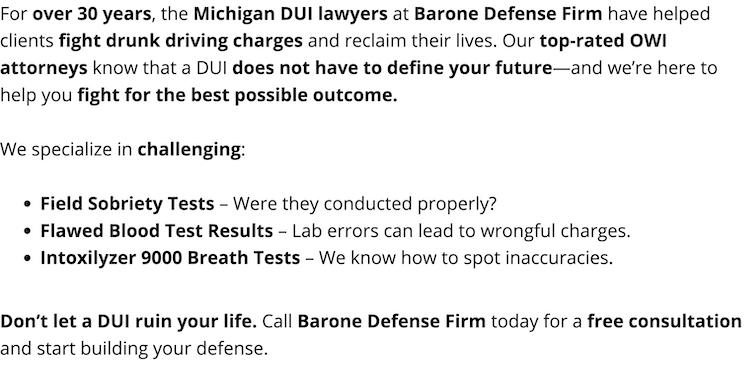Knowing Allowing an Intoxicated Person to Operate
Suppose that you and your friends are out enjoying a few drinks and your designated driver decides to join in for a few rounds before driving everyone home in your vehicle. Or, imagine that you and a friend both have been drinking and decide that the "more sober" person will drive home; you then hand your keys over and let your friend take the wheel of your car.
Although you may have had good intentions in both scenarios, the fact is that under Michigan state law, you can be held legally responsible for knowingly allowing an intoxicated person to operate your vehicle.
Elements of the Crime
Every crime is made up of what the prosecutor calls "elements." For a crime to exist, each element of that crime must be proved beyond a reasonable doubt. A big difference between a DUI charge and a knowingly allowing DUI charge is the obvious addition of the word "knowingly." The word knowingly requires a presence of mind and possibly a specific intent to commit the crime as well. This is important because other kinds of DUI are general intent crimes. This element of "knowing" is likely the most difficult element for a prosecutor to prove and is the reason so few of these charges are written by the police.
Penalties for Allowing an Intoxicated Person to Operate
If you are charged with knowing allowing a person to operate while intoxicated (OWI) you could face significant penalties. The severity of the charge and the potential penalties you face will depend on the circumstances of your OWI case. As you might expect, if injury or death occurred, then the penalties are much greater. With a serious injury you could be looking at up to two years in prison and for a death, up to five years. There are significant fines and costs as well.
Driver License Sanctions
Knowingly allowing another person to drive is considered a non-moving violation. Therefore, it is not "abstracted" and will not ever appear on your driving record. This means there are no points and no driver license sanction. If you are convicted of knowingly allowing another person to drive, your license will not be restricted, suspended, or revoked.
Plea Bargaining to Knowingly Allowing an Intoxicated Person to Drive
In some cases, the Michigan DUI Lawyers at the Barone Defense Firm have been able to arrange for a client charged with OWI to plead guilty to knowingly allowing. When available and appropriate, this can be an outstanding result, primarily because this offense does not appear on the driving record and carries with it no license suspension or revocation. The plea is based on a legal fiction because the person allowing the intoxicated person to drive, and the intoxicated person are the same. Nevertheless, this is legally appropriate, and most judges will allow a plea to this added charge when it is offered by a prosecutor.
Expungement of Knowing Allowing Intoxicated Person to Drive
Like most first offense drunk driving cases in Michigan, a conviction for knowingly allowing an intoxicated person to drive can be expunged after five years. To find out if your DUI conviction is eligible for expungement, please see the article What Michigan Drunk Driving Convictions are Eligible for Expungement? Expungement is one of the major benefits of a plea bargain or reduction from a traditional drunk driving offense to the non-moving violation of knowingly allowing an intoxicated person to drive. Because it is a non-moving violation, the conviction will not show up on your driving record after your expungement. Therefore, a plea to knowingly allowing an intoxicated person to drive solves many of the biggest problems applicable to a drunk driving conviction and helps the driver to avoid several of the most concerning collateral consequences. Be sure and discuss all this with your attorney before you plead guilty so that you can make the best decision in your case.
 Barone Defense Firm Home
Barone Defense Firm Home
















